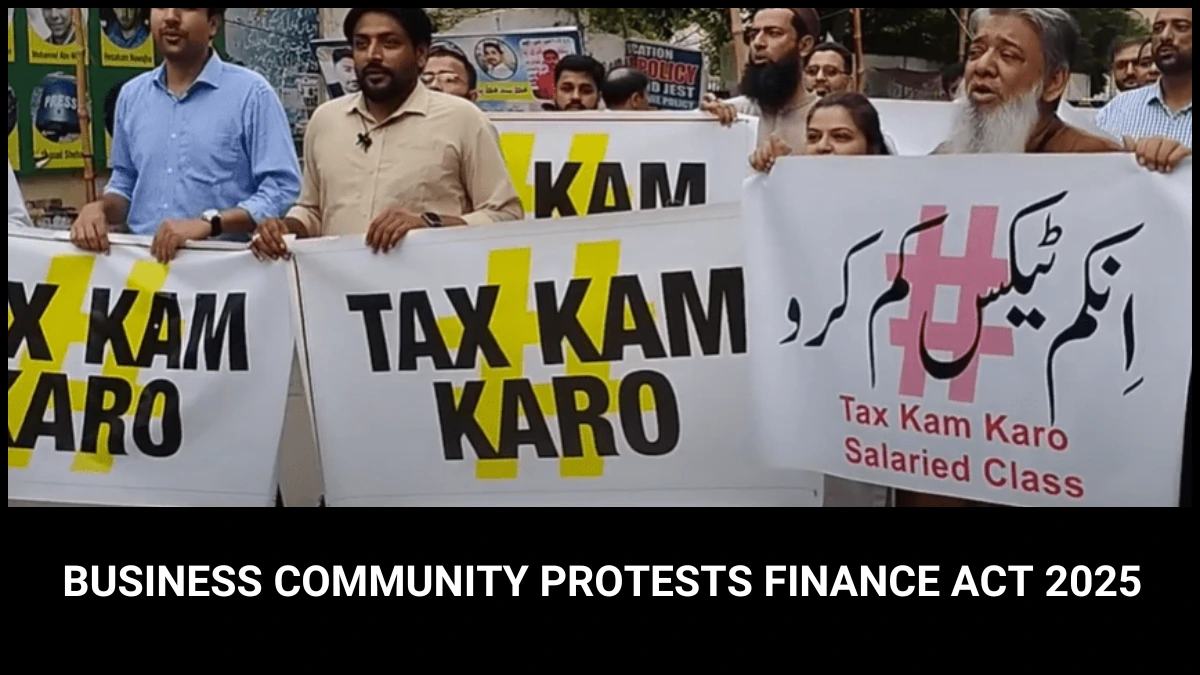
Pakistan Business Community Protests Finance Act 2025: Demands for Fair Tax Reforms
- Zain Ul Abideen
- Reading Time 7

On July 19, 2025, Pakistan’s business community staged a massive nationwide shutdown to protest the Finance Act 2025. Led by the Federation of Pakistan Chambers of Commerce and Industry’s Businessmen Panel (BMP), traders, industrialists, and retailers across cities like Karachi, Lahore, Hyderabad, and Peshawar closed their shops and factories. They are demanding the removal of what they call “oppressive” tax laws, including Sections 37A and 37B of the Income Tax Ordinance, as well as SRO 350 and SRO 709. These rules, they argue, threaten businesses with unfair taxes and excessive powers for the Federal Board of Revenue (FBR).
Why Are Businesses Protesting the Finance Act 2025?
The Finance Act 2025, which took effect on July 1, 2025, introduced new tax measures that have angered Pakistan’s business community. BMP Chairman Mian Anjum Nisar called the shutdown a “vote of no-confidence” in the government’s economic policies. The main issues include:
- Sections 37A and 37B: These give FBR officials the power to arrest and prosecute business owners without proper legal process, creating fear among traders.
- SRO 350 and SRO 709: These rules enforce complex electronic invoicing (e-invoicing) and e-Bilty systems, which many businesses find hard to implement due to lack of training and infrastructure.
- Cash Transaction Penalties: Section 21(s) imposes heavy fines for cash transactions above PKR 200,000, affecting small businesses that rely on cash.
- High Taxes on Property and Transactions: A 16% sales tax on property rent and a 20% tax on transactions over PKR 200,000 have added financial pressure on businesses.
Mian Anjum Nisar said these rules were introduced without proper discussion with businesses, leaving them feeling targeted. “You cannot fix the economy by scaring its backbone,” he warned, highlighting the unity of traders across Pakistan.
Nationwide Shutdown: Impact on Karachi, Lahore, and Beyond
The strike on July 19 was one of the largest protests by Pakistan’s business community in recent years. In Karachi, about 90% of commercial activities, including wholesale markets, retail shops, and industries, stopped. No export shipments left the port, and all seven industrial zones halted production. In Lahore, major markets like Shah Alam Market and Anarkali shut down completely, showing strong support for the protest.
Smaller cities like Faisalabad, Gujranwala, Sialkot, Quetta, and Peshawar also joined the strike, making it a nationwide movement. However, Islamabad and Rawalpindi saw normal business activity, as the Islamabad Chamber of Commerce and Industry (ICCI) chose to wait for government promises to be fulfilled.
City | Strike Impact | Key Markets Affected |
Karachi | Near-complete shutdown (~90%) | Wholesale, retail, industries, ports |
Lahore | Complete closure of major markets | Shah Alam, Anarkali, Urdu Bazaar, Hall Road |
Islamabad | No impact, businesses open | Jinnah Super, G-9 Markaz, Blue Area |
Peshawar | Partial to full shutdown | Local markets |
Hyderabad & Quetta | Significant closures | Commercial centers |
Business Community’s Demands for Economic Justice
The BMP and other trade bodies, like the Karachi and Lahore Chambers of Commerce and Industry (KCCI and LCCI), are not against tax reforms but want fair and practical changes. Their key demands include:
- Remove Sections 37A and 37B: Stop FBR’s arrest powers without court approval.
- Revise SRO 350 and SRO 709: Simplify e-invoicing and e-Bilty rules with proper training and timelines.
- End Cash Transaction Penalties: Withdraw Section 21(s) to support small businesses.
- Lower Taxes: Reduce the 16% sales tax on property rent and 20% tax on large transactions.
- Restore Final Tax Regime: Bring back simpler tax rules for exporters.
Mian Anjum Nisar emphasized that businesses support digitization but need time and resources to adapt. “Pakistan’s economy runs on trust and dialogue, not sudden rules and threats,” he said.
Government Response and Ongoing Talks
The government has formed a committee, led by Special Assistant to the Prime Minister (SAPM) Haroon Akhtar, to address traders’ concerns. Some progress was made, including an agreement to remove Clause 9 of the Finance Act and review Section 37A. However, the KCCI and LCCI are frustrated because no written promises have been made.
The Federation of Pakistan Chambers of Commerce and Industry (FPCCI) initially called off the strike after talks but later supported the protests when no firm action followed. KCCI President Jawed Bilwani warned that without written assurances, businesses might extend the strike or take stronger actions, like halting tax filings.
Economic Risks of Ignoring the Protests
The BMP warned that ignoring these demands could harm Pakistan’s economy further. The strike already disrupted supply chains, stopped exports, and closed markets, costing billions in revenue. If the government does not act, businesses fear:
- Investment Flight: Companies may move to other countries due to fear of FBR’s powers.
- Job Losses: Small businesses may shut down, leading to unemployment.
- Reduced Exports: The halt in industrial activity could hurt Pakistan’s trade.
LCCI President Mian Abuzar Shad called the strike a “defining day for economic justice,” noting that Karachi and Lahore alone make up over 60% of Pakistan’s economy.
What Next for Pakistan’s Business Community?
The business community is planning more protests, with the All Pakistan Anjuman Tajiran announcing demonstrations starting July 26, 2025, if demands are not met. The BMP and other groups are pushing for written government commitments to reverse the controversial tax laws. They remain united, with over 50 trade associations supporting the cause.
The peaceful and disciplined strike on July 19 showed the strength of Pakistan’s traders and industrialists. “We are not looking for a fight; we want fairness,” said Mian Anjum Nisar. The ball is now in the government’s court to act quickly and restore trust.
Traders community is set to protest against the #FBR law and tax on bank transactions by observing a strike.
— SAMAA TV (@SAMAATV) July 19, 2025
Shutters down in key markets.#SamaaTV #LahoreStrike #FBR #TaxProtest #BusinessCommunity #PakistanEconomy pic.twitter.com/k3riqYFgCd
The Finance Act 2025 is a set of tax laws introduced by Pakistan’s government on July 1, 2025. Businesses are protesting because it includes rules like Sections 37A and 37B, which allow FBR officials to arrest taxpayers without court approval, and SRO 350 and SRO 709, which enforce complex e-invoicing systems. These are seen as unfair and harmful to businesses.
Sections 37A and 37B give the Federal Board of Revenue (FBR) the power to arrest and prosecute business owners suspected of tax issues without proper legal process. Traders say these rules create fear and could be misused.
SRO 350 and SRO 709 are government orders mandating electronic invoicing (e-invoicing) and e-Bilty systems for businesses. They are controversial because many businesses lack the technology or training to comply, and non-compliance leads to heavy penalties.
The strike caused a near-complete shutdown in cities like Karachi and Lahore, halting 90% of commercial activity, including markets, industries, and exports. It disrupted supply chains and cost billions in revenue. However, Islamabad and Rawalpindi remained unaffected.
The business community demands the removal of Sections 37A and 37B, revisions to SRO 350 and SRO 709, withdrawal of penalties on cash transactions, lower taxes on property rent and transactions, and the restoration of the Final Tax Regime for exporters. They also want more consultation and gradual implementation of digital systems.
Send Us A Message

Punjab Schools Reopen: New Schedule for August 2025 After Reduced Summer Vacation

Earthquake Today: 5.4 Magnitude Quake Jolts Pakistan, 8.8 Hits Russia

Tsunami Waves Hit Pacific Coasts After Massive Russia Earthquake

Mardan Board Result 2025: Punjab Private Schools Shine, Government Schools Improve














